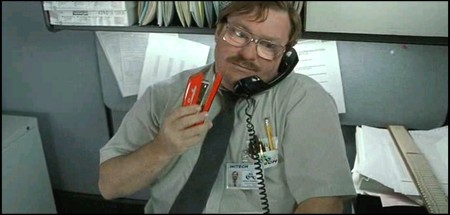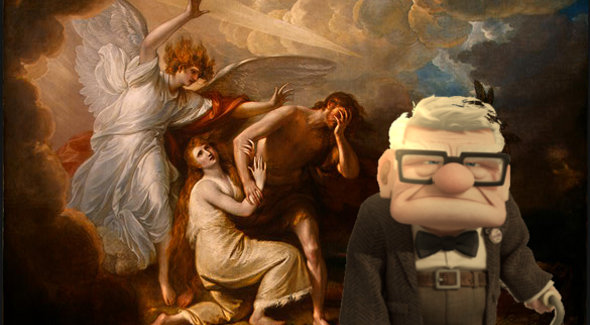The Theoden Trap

If he uses "begging the question" wrong, execute him!
The Theoden Trap is a specific sort of question-begging related to the existential problem of aging. King Theoden has withered in his age into a pale remembrance of his former self, but it turns out his impotence, infirmity and depression have been reinforced by the presence of the scoundrel Gryma Wormtongue. When Gandalf dispels Gryma’s magic, Theoden rises from his throne and realizes that, through faith in himself, courage and the council of friends, he has regained enough strength and youthfulness that he can ride to war against Sauron and Saruman.
The problem with the Theoden Trap is that Theoden is not the victim of natural aging, he’s the victim of poor council and a lack of faith in himself, which he misinterprets. But it only addresses the existential problem if it has been falsely as aging. It is easy to extrapolate the revival of Theoden (and the archetypical plot point it exemplifies) in an Emersonian way to insist that “You are only as old as you feel.”
While this is true, valid and useful, and it helps frame for us what aging means in a positive and encouraging manner (and inspiring courage, as far as I’m concerned, is a worthy side goal for any piece of art) it only approaches the superficial drawbacks of aging, it doesn’t tackle the central existential questions of what it means to be moving through time (and not in an uber-cool gravity slingshot or wormhole, either).
In other words, it’s about morale and feelings. It’s about having the resources to cope, which is different from having the frame of mind to comprehend or the basis for difficult knowledge.
A very basic synopsis of Up sounds like a big Theoden Trap. An elderly shut-in decides to tie some crazy balloons to his house, and with the help of a young kid, he finds his confidence and realizes how fun it is to be alive!
While a little bit of this happens in Up, Carl is never shown as particularly incapable, just stubborn and stationary. He’s always vigorous – he’s an angry shut-in. That’s not his arc.
More immediately though, the Theoden Trap interpretation of Up ignores the whole “I’m going to metaphorically bury my wife and find my own grave” angle, which, after the tremendously sad first reel, is pretty hard to miss, at least in tone. The obvious symbol (the balloons on the house) does not go in the obvious direction (fancy and youthfulness), but is instead committed to something much more serious (faith, duty and loss).
The juxtaposition of the balloons and the grief – of escaping home and taking it along – the moment is deeply ironic, but also very sincere – not “Earonic,” as some of my colleagues would say. That terms shows such slavery to the dialectic, a mental hangup on the notion of argument and dichotomy – the notion that any two extremes must lie on a continuum, and that anything that has characteristics of both must be in the middle. I may be wrong or arrogant (or both), but I believe this is a big-time case of “seeing the strings on the Enterprise” – mistaking the conventions of talking about art for the qualities of the art itself. The balloons in Up are both deeply sincere and deeply ironic, and it is a challenging thing to talk about that in a common-sensical way.
But that’s okay, because they made a movie about it, and if you feel the need to revisit or understand the concept, you can watch the movie. It is easy to tell art is successful if the art itself is the best way to articulate its own purpose or qualities.
Milton deals with this challenge in many ways, most notably by the way his heavily enjambed form draws necessary comparisons across dialectical divides, poetically articulating logical impossibilities that are nevertheless meaningful thoughts. Milton loves “or.”

Milton deals with challenges in many ways. Like how he's going to set the building on fire.
But the more direct way, the way that leads me on to further interpretation of Up, is his monistic theology and the way he models systems of mutual, voluntary dependence in his great works. The quotation that began this section, about how the angels and the cosmos feed off each other, and the incorporeal and corporeal become one another is a beautiful example of it (and the passage runs quite a bit longer than what I was willing to quote – I recommend checking it out).
Monism is, simply, that, where it looks like there may be many things, there is really just one thing – according to Milton’s de Doctrina Christiana (a long-lost personal tome of theological discourse written by Milton and found 150 years after his death) matter and spirit are one thing that has complex and mysterious interaction with itself. God is a physical being, though of mysterious position, form or substance.
From this foundation, Milton abandons certain polarizing notions that govern the common considerations of different ideas or abstractions (master/servant being the most notable) in his poetry and replaces them with the ideal of a natural, blessed, sinless knowledge unspoiled by human thought that has insisted on driving divisions into the natural order of things.

Bravo.
What more can I say?
Overthinkinit.com: Pop Cultures answer to Rinzai Zen.
@Michael Williams
One thing I have always kind of exasperatedly yelled at people (which is probably why they don’t listen) is that you don’t have to get all orientalist for this kind of thinking. There are rich traditions of this sort in all cultures – there is nothing new under the sun.
I think that defying the notion that the people and culture who do cool things are people and cultures other than you and yours is one of my major motivations in writing for Overthinking It.
Well, that and the ladies. I do it for the ladies.
Yes of course. You need not go Said on me.
However, the severity of analysis does from time to time border on the Koan-like imho.
Tit for tat aside.
Who’s leg do you have to hump to get some McLuhan fused analysis around here?
I have yet to see Up myself, but just one viewing of the trailer was enough to solidify my opinion that whatever sandbox Pixar decides to play in, the end result will invariably touch upon that deep part of the human condition that, as you said, only art is able to express (or reflect). It’s funny how a metaphor- by definition an indirect representation of something else- is often the most effective means of conveying truth. Thank you for writing this, Fenzel. I now have something more to ponder on my way out of the theater when I finally have the time to see this masterpiece.
And there are still piles of snob critics out there who don’t believe anything with the name Disney (even adding Pixar) on it can be any good, or contain any serious ideas. This should start to show them.
Best final fantasy reference ever?
Up was incredible. Your analysis has some great stuff, particularly about epistemology stunting discourse, and art being a language unto itself. I completely agree, but your conclusion feels like a cop-out. If we are to subside and let the art speak for itself, then why bother writing to begin with – only to say ‘look out for these themes and see it for yourself’? I believe ideas have to be realized for each person, that the infectiousness of a truth is not contingent solely on just how much sense it makes. And so I agree that a person ought to experience a work of art in his or her own time and feel what truth is appropriate to his or her biography and present.
So why write? Personally, I write because I feel that art is being mistreated, that the masses’ approach to art is inappropriate to the art (although much art is being adapted for appropriateness to the common approach). If you have a feeling or idea, a response to Up, treat it purely. Your subjective response is in itself its own work of art, and I can learn from it. I feel as though you’re holding back.
I’m being very nitpicky though. Your thoughts are a pleasure to read, and you’ve made me want to read Paradise Lost. I’m ignorant to Milton’s work, so because of this, I at least now have interest. Thanks for the stimulating read, this strikes me as being unlike any other place writing about movies, and I think you’ve got a reader in me now.
I know nothing about Milton’s Paradise, but I found this review to be one of the most insightful ones online about Pixar’s UP. And I should know, because I scoured the web for information on UP in order to prepare for writing my own review. You can read it here.
The Spirit of Pixar’s UP
I decided to copy your style by including quotes in my review from a classic work, but in my case it is “Romeo and Juliet”. I elaborated on your Adam and Eve theme and suggested that this is A&E in reverse. Where the protagonist is heading toward the Garden of Eden instead of being thrown out of it. I also compared the story to Don Quixote and the Wizard of Oz.
I hope you get a chance to read my review and comment on it.
Yes. Best Final Fantasy reference,… well not ever but in a damn long while. I actually had to cover my mouth to quiet the horrible giggling that friggin’ picture caption got out of me, for fear of waking up other people in my house.